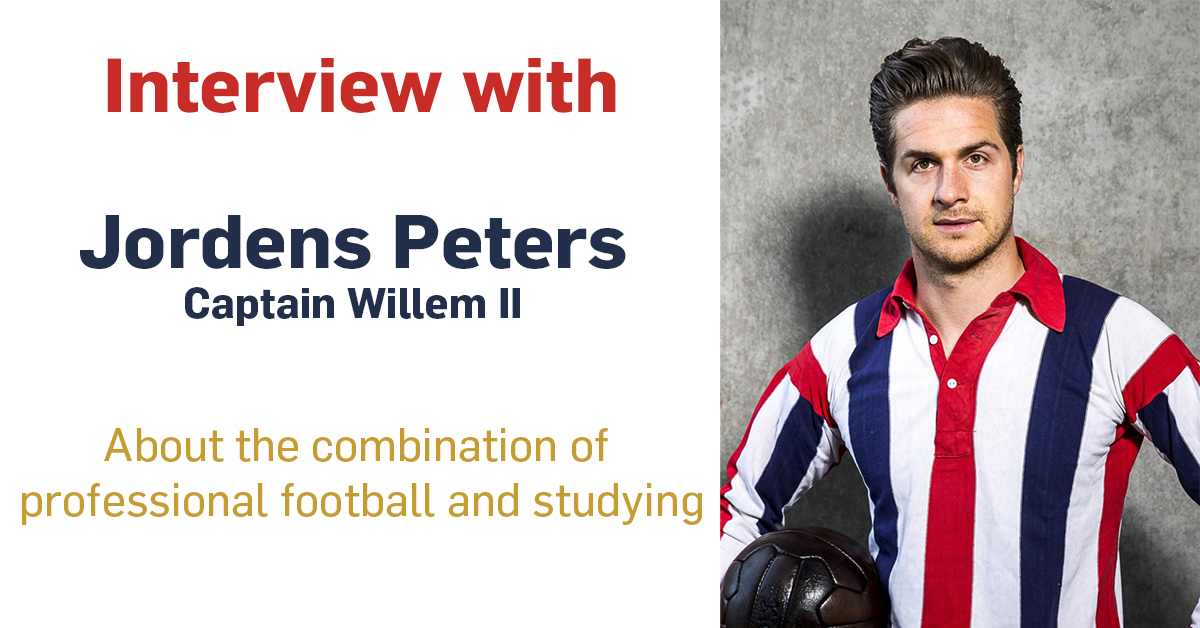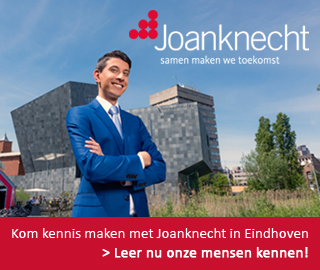For the Dutch version, click here
Your student days are the prime days of your life. Not only your brain capacity, but also your physical ability is optimal in this phase of life. When the opportunity arises to enter the world of professional sports, many people choose to focus entirely on either of these two options: or studies, or professional sports. In this interview, Jordens Peters, former student at Tilburg University and also captain at Willem II, tells about the way he combined his professional football career with his studies.
Jordens, could you tell us something about your personal background and how you ended up at Willem II?
I grew up in Berlicum, a village near Den Bosch. There, I played football for the local club BMC. After winning a tournament held for clubs within the province of Brabant, FC Den Bosch scouted me, the club where I played in the youth academy from beginning to end. Around the age of 18, I signed my first contract at FC Den Bosch and made my debut. In this period, I also finished my pre-university education. After my pre-university education, I enrolled for the bachelor program in Organizational Sciences at Tilburg University. After playing at FC Den Bosch for seven years, I got the opportunity to make a transfer to Willem II. After finishing my bachelors, I graduated from the part-time master program in Management at the Open University.
Back then, did you get the freedom and opportunity to combine professional sports with your studies at Tilburg University and the Open University?
All this time, I had a professional sports status at Tilburg University. For example, I had the opportunity to ask for additional resits if I could not make it to the first or second exam, due to either a training camp or match. However, I did not have a lower ECTS threshold in my first year, something the university does provide nowadays. Thus, the conditions of a professional sports status have improved over the years. I did get exemptions from group assignments every now and then, and a top sports coordinator who supported me if necessary. It was certainly well-thought. The university showed understanding towards your professional sports status and took it into account. At the Open University I followed a part-time master, which suited me well as the emphasis laid on studying from home.
How well could you combine your studies with professional sports?
It went very well during the first year. I obtained sufficient ECTS to continue my studies. However, over the years, things were getting more difficult due to the complication of combining studies and sports. I trained a lot, and therefore my fellow students went ahead of me which resulted in my being on my own. Since I trained that much, it was difficult finding the motivation to attend lectures. Back then, together with my professional sports coordinator I decided what would be best for me. We decided that it would be better to follow one or two courses per semester. If I would follow two courses per semester, I would get an 8 on the exams. However, if I would follow three or more courses, I would only obtain a 5 as final mark
Have you ever considered to stop studying in order to fully focus on your professional football career?
Of course, at some moments during your studies you consider quitting. However, at a certain moment you have come so far in your studies, that it would be a pity not to finish it. In addition, the schedule that I made together with my personal coach worked well, which gave some extra motivation to continue. Also, I realized that a football career does not last forever, and that there is a certain probability that you will not reach the top or become injured. This thought gave me extra stimulation to finish my studies.
Consequently, you decided to follow a master at the Open University, did you have a specific reason for that?
After finishing my bachelors in Tilburg, I had multiple conversations with my study coach. From these conversations, it became clear that passing seven courses and a master’s thesis would not be realistic next to playing football. Another option would be a part-time master, however this program was not offered in Tilburg back then. Therefore, I chose to follow the part-time master program Management at the Open University. At that point in life, this program suited my busy life very well.
“If you are good at sports, and have a smart brain, it would be a pity not to use both of them.”
What was the biggest challenge for you when it comes to combining professional sports with your university studies?
For me, it was the energy level that it requires. Within football, you work towards a game all week long. This means that at the beginning of the week, you train more intensively. However, since I did not want to sit behind my laptop for a few hours to study on a game day, I scheduled most of my study-related activities to the beginning of the week as well. This made me put more emphasis on my studies in the beginning of the week as well, which resulted in a very heavy start on the first few weekdays, that required a lot of motivation.
Faces Online articles are mainly read by students interested in the financial world. Could you tell a little more about the financial side of football?
As a football player, you sign a contract for several years. As soon as your contract is about to expire, your agent will talk to the club and come up with a new contract proposal. For example, you can grow from being a substitute to being a fixed and valuable player within 3 years. However, it could be that nothing changes salary wise. You then have to wait for the next negotiations. In general, you get a better offer every time negotiations take place, as long as you perform well and become more important for the team. This is especially true if different clubs are interested in you as a player. After two years, I became captain at Willem II, but that does not immediately mean better pay. However, when new negotiations start, you have a better bargaining position. Then, you can express that you are an important player within the team as the captain, something that you also want to be rewarded for.
Did/do you sign any personal sponsoring contracts?
Personally, I do not. However, other players do have personal sponsoring contracts. For example, they do so with Nike. They get Nike football boots and a certain clothing budget. You often see so in the case of strikers, those who score the goals, or young talented players. In addition, this has been going hand in hand with social media over the past few years. The players who are active on social media will more likely have their own sponsors. Therefore, it is possible to sign personal sponsoring contracts, as long as these are not in conflict with the club’s sponsors.
What are your ambitions as soon as your football career is over?
After my master, I also finished the extended master’s in Sports Management & Law. My personal interest is to remain active in the field of sports. Not standing on the pitch, yet rather fulfilling an organizational position. However, this is difficult, as football is a strange world which essentially makes you live in a bubble. This makes it complicated to imagine what the rest of society looks like. This is what makes me curious. Nevertheless, it is always tough to predict how your life after a professional sports career will look like.
Do you have any tips for students having the possibility to practice professional sports during their student days?
First of all: go for it, no matter what. In the end, professional sports are something that teaches you a lot. You develop yourself and it forms your character. It is a difficult world that contributes a lot to you as a person and this benefits you for the rest of your life. Just take a look at how many professional sports players became successful entrepreneurs, mainly due to their mentality. I would recommend combining professional sports with studies, as you will be busy with several things and orient yourself broadly. If you are good at sports, and have a smart brain, it would be a pity not to use both of them.

















